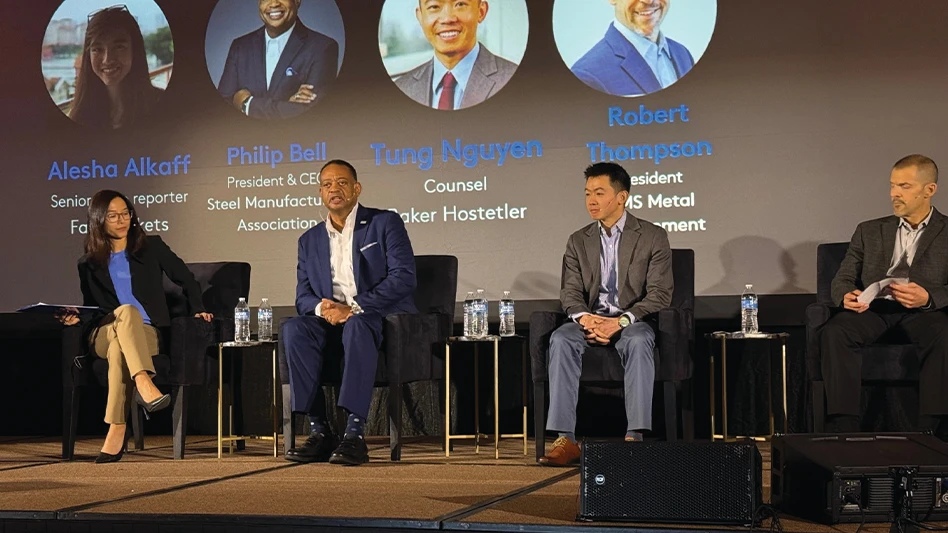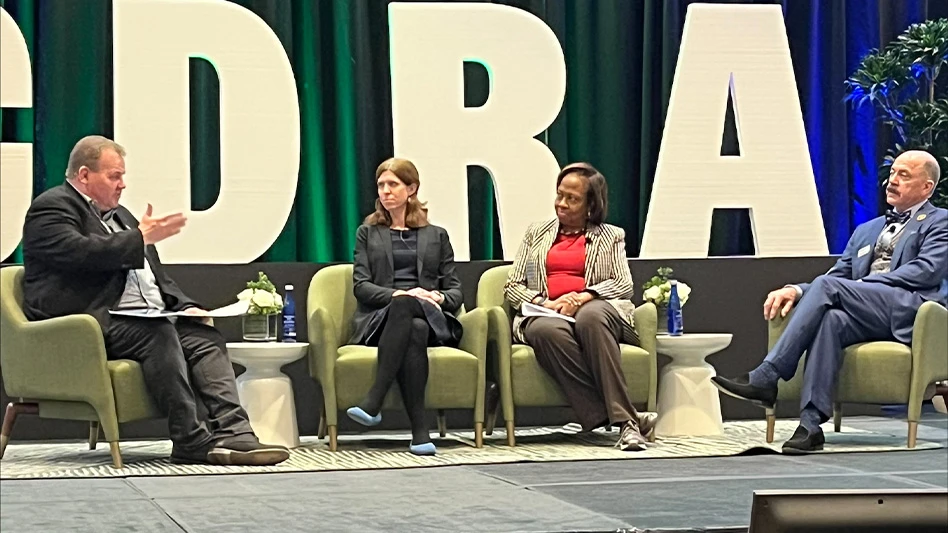
Pictured above, from left: Oliver Campbell of Dell and Kim Holmes
of the Plastics Industry Association, host of Re|focus 2018.
Dell Technologies, headquartered in Round Rock, Texas, says it has committed to keeping plastics in the economy and out of the ocean, creating what it calls the first commercial-scale global ocean-bound plastics supply chain, Nextwave. The company’s Oliver Campbell, director of worldwide procurement and packaging, shared the steps the technology company has taken to process plastics collected from beaches, waterways and coastal areas for use in a new packaging system for the XPS 13 2-In-1 laptop globally during the Opening Plenary session at the Re|focus Sustainability and Recycling Summit.
“Dell is thinking circularly, not linearly,” Campbell said, adding that sustainable materials are the foundation of the company’s circular economy approach. “Recycled plastics factor largely into our manufacturing.” (For a 2017 article on Dell’s use of recycled plastics in its products, see “Recycled content computes.”)
In 2017, Dell used 8 metric tons of ocean-bound plastics in its packaging.
Ocean plastics have “quite a bit” to do with computers, he said, noting population growth and technology preferences in developing countries such as Southeast Asia, which is a large contributor to the ocean-bound plastics problem. “It is very much in our business interests to address these issues,” Campbell added.
Eight million tons of plastics enter oceans annually, he said, with 60 percent originating from South Asia. That figure is expected to increase to 18 million tons by 2025, Campbell added.
While other companies have used ocean plastics to create new packaging, these projects largely were intended to raise awareness of the issue and did not scale economically, he said. Dell and Lonely Whale, with locations in New York and Seattle, formed a collaborative and open-source initiative called NextWave, convening General Motors, Trek Bicycle, Interface, Van de Sant, Humanscale, Bureo and Herman Miller, to address this scalability issue. NextWave assembled leading technology and consumer-focused companies to develop the first-ever commercial-scale ocean-bound plastics supply chain. Additional supporting members of the group include UN (United Nations) Environment, 5Gyres Institute, Zoological Society of London and New Materials Institute at the University of Georgia.
To create a sustainable solution for ocean-bound plastics, Campbell said, the cost point must be at parity or less than virgin options for Dell.
“Dell’s strategy is to leverage strengths in innovation and supply chain to create an open, scalable, economically viable solution,” he added.
To that end, the company is intercepting plastics before they reach the ocean by addressing mismanaged waste within 50 kilometers (30 miles) of the coastline that would otherwise end up in the ocean without improved management infrastructure. “Once it gets to the ocean,” Campbell said, “plastic is very difficult to retrieve and degrades.”
Dell has made a United Nations commitment to increase its use of ocean-bound plastics tenfold by 2025, creating an open-source supply chain for others to follow, he added.
While Dell began by using ocean-bound plastics from Haiti, Campbell said the supply chain will shift to Southeast Asia for improved costs. The company’s research revealed that Indonesia and India were preferred sourcing locations with capable processors. Dell identified three processors in these countries as potential suppliers of ocean-bound plastics.
Campbell said the breakthrough for commercial scalability came when Dell identified that the cost of Indonesian ocean plastics was below the cost of postconsumer resins (PCR) and virgin material from China.
Dell’s use of ocean-bound plastics in its packaging is increasing to the rest of the company’s XPS NB line this year. In 2019, Campbell said the company plans further expansions.
As the use cases expand beyond Dell, he said, the consortium’s volume will increase “dramatically,” greatly increasing the impact on ocean health as well.
Dell is currently blending 25 percent of its ocean-bound plastics into its packaging, with Campbell saying the company wanted to do better than the 10 percent most other companies using ocean plastics were incorporating but giving the company room to grow, as well. “We never want to be decreasing our use; we always want to be increasing it,” he added.
Re|focus was May 8-10 in conjunction with NPE 2018 in Orlando, Florida.
Latest from Recycling Today
- BlueScope’s new CEO affirms bid rejection
- US steel imports finish 2025 down 12 percent
- Cascades sells corrugating plant to Crown Paper
- You have production scrap, WEIMA machinery processes it where it’s made
- CP Group, Cisek Inspections forge innovative X‑ray recycling alliance
- Regroup, CP Group unite for cutting-edge Halifax MRF
- Modern MRFs: AI, automation and safety, redefining recycling operations
- CalRecycle opens comment period on proposed SB 54 revisions





